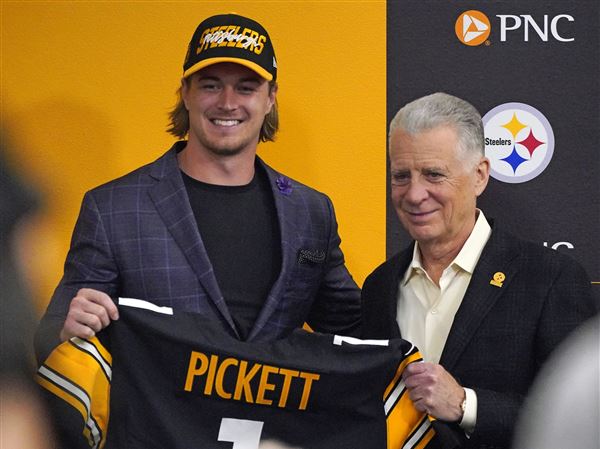Elizabeth Concordia was a teenager when she volunteered to work at Temple University Hospital's emergency room, a unit known gruesomely in urban Philadelphia as the "knife and gun club." She remembers hauling bodies to the morgue and taking cops to see crime victims while her mother recalls 13-year-old Liz holding and calming young burn victims.
"Aides said she never panicked," said Dr. Marion Ball, a Temple computing professor at the time and Mrs. Concordia's mom. "Her brother called her 'Crisis Liz.' That is where she was at her best ... in a crisis."
The poise on display inside that Philadelphia ER three decades ago is one of many reasons why the 44-year-old Mrs. Concordia may be in the running to one day succeed Jeffrey Romoff as head of the nonprofit University of Pittsburgh Medical Center, the region's largest employer (48,000 workers) and dominant medical provider, approaching $8 billion in annual revenue.
No one expects the 62-year-old Mr. Romoff to step down anytime soon, and even if he were to leave, UPMC most likely would conduct a national search for his replacement. But many in and out of the system argue that Mrs. Concordia would be a strong internal candidate -- if that's what she wants, and if she sticks around long enough to vie for it. She already has a close working relationship with Mr. Romoff and UPMC board Chairman G. Nicholas Beckwith III, according to sources familiar with both executives.
"Nick thinks the world of her," said one person who works with Mrs. Concordia. "I thought Jeff {Romoff} was going to eat her up for breakfast," the person added, but she "has held her own." The two now appear to be "in sync" although they are "totally different people."
Mrs. Concordia arrived at UPMC only six years ago as the 38-year-old president of the flagship UPMC Presbyterian/Shadyside. Now in charge of all 20 UPMC hospitals, including the Mercy Hospital of Pittsburgh that UPMC took over Jan. 1, she draws a salary of more than $1 million ($1.07 million in fiscal 2006, the most recent information available) and as part of a divisional realignment last November, she became one of the system's four executive vice presidents -- a level below Mr. Romoff. The other three are Diane Holder (in charge of insurance); Chuck Bogosta (in charge of UPMC's commercial and international ventures); and Dr. Marshall Webster (in charge of the faculty physicians).
Asked about all this, Mrs. Concordia sidestepped any talk of a larger leadership role at UPMC, arguing that she and Mr. Romoff are focused on organizational goals.
"Jeff and I always talk about the vision for UPMC, and where we are going and how do we actually make that happen. I am clearly committed to him and what we are doing and that is really what we focus on each and every day." Her new title, she said, does not bring any added responsibilities, although she did relinquish the presidency of UPMC Presbyterian/Shadyside to John Innocenti, the hospital's former chief operating officer. "The reason I came to UPMC was Jeff Romoff ... so I think if anything [the new title] is just a strong indication of how solidified he and I are as a team."
She acknowledged receiving offers from other institutions, but emphasized that "I love it here," and she has "no intentions of going anywhere else at this point."
Many colleagues, both current and former, rave about Mrs. Concordia's skills and temperament, saying she is fair, direct and intelligent, while blessed with rare interpersonal abilities. "She would be a star anywhere. She is one of the brightest, most insightful, thoughtful people I have ever had the pleasure of working with," said Ross Zafonte, formerly UPMC vice president of rehabilitation services and now at the Harvard Medical School. Johns Hopkins Bayview Medical Center President Greg Schaffer, who worked side-by-side with Mrs. Concordia in Baltimore before she came to Pittsburgh, said he knew of only one person who did not like Mrs. Concordia, and that was someone she beat out for a promotion. "I always thought that Liz was born with a lot of things it takes many of us years and years, if not decades, to develop," he said. "She is extremely bright and very creative and really stays focused on getting things done."
Not everyone is a fan, though. One health-care executive who has worked with Mrs. Concordia said, "My biggest concern about her is she is a clone of Jeffrey [Romoff]; it is her way or the highway." Both "manage by fear. It worked for Jeffrey. I am not so sure it is going to work for her."
Mrs. Concordia readily acknowledges that she is not popular with everyone. "Yes, there are physicians who don't like me," she said, "but I am the one who has to put my pillow on my head at night and know I am doing the right thing for the patients." And "if you want to do what is right for the patient, you have to make tough decisions. Status quo just isn't OK."
The concept of rightness has particular meaning for Mrs. Concordia's family. Her German grandmother, Erica Lestmann, won a gold medal at the 1928 Olympics as a track and field athlete but lost her job as a physical education teacher after she declined to give the Nazi salute while on a field trip with her class. Mrs. Concordia's German grandfather, Ernst Jokl, a Jewish man who was an alternate in the 1928 Olympics and became a pioneering figure in the development of sports medicine, married her grandmother the day she was dismissed as a teacher, and the couple left Germany a few weeks later for South Africa, seeing "the writing on the wall," Mrs. Concordia said.
Her grandfather instituted a physical education curriculum for young South African boys and girls of all races (the phrase "to exercise" in the Afrikaans National Dictionary is now "Jokkel"), but left for the United States once apartheid became the governing political policy in 1948.
"There is a very strong feeling within [the family] of what is right," said Dr. Ball, Mrs. Concordia's mother. "If you really think you are right and your conscience is clear, then you can stick with it. [Mrs. Concordia] is not the kind of person who will waver, not like the Germans who said, 'We knew it wasn't right and we went along with it.' She would have been out there saying, 'I am going to stand up to it.' "
A photo of the late Mr. Jokl sits on a shelf overlooking Mrs. Concordia's desk in Shadyside (she also has an office in Oakland). Behind her desk is a wallboard of family snapshots featuring her three children -- "my priority board," she calls it. Near the door is a bookcase stuffed with texts; Mrs. Concordia notes that "every book in this bookcase was written by one of my family members" -- her mother is a internationally known scholar of health information (she first addressed the need of an electronic health record in the early 1970s and authored a children's book called "What's A Computer?" as a show-and-tell project for her daughter), while her father is a scholar specializing in drug addiction.
Mrs. Concordia grew up in a house where German was spoken (she is fluent in that language) and where scholarship and medicine were prized. Her mother said Mrs. Concordia was independent but good at making friends, athletic and full of a desire to be managerial. At age 16 or 17, she ran a Philadelphia health club in her free time after school, according to her mother, helping older ladies in and out of the pool, washing towels, cleaning the rooms.
Her first year at Duke University, Mrs. Concordia was pre-med but quit that major because the lab work interfered with field hockey and lacrosse. (Mrs. Concordia eventually became captain of Duke's lacrosse team). Once she graduated from Duke, she wanted action, not scholarship, in the health-care field. She installed hospital information systems; became a manager of health-care information systems for Ernst & Young (while working toward a master's degree in health-care systems management at Johns Hopkins); had an early 1990s stint in the director's office at a Bronx hospital; and then spent eight years at Johns Hopkins Bayview Medical Center, eventually rising to chief operating officer.
Hired in 2001 to complete the integration of Oakland's UPMC Presbyterian and UPMC Shadyside, Mrs. Concordia had to make peace with two separate cultures -- the academic emphasis in Oakland and the private practice tradition in Shadyside. There are still doctors in Shadyside who feel the academic side is overly dominant.
"She is sensitive to the issues," said Dr. William Swartz, president-elect of the UPMC Shadyside medical staff. "How many of those issues get resolved in our favor is somewhat open to interpretation. It is a steady erosion. Even if she wanted to do some of the things private practice doctors wanted, I don't know if she would feel free to do them." Mrs. Concordia "has got a conflict of interest ... it is all about dollars when it comes down to those kinds of things."
But Dr. Swartz and others credit her for not promising more than she can deliver.
"She is a no-nonsense person," said Dr. Dennis Meisner, past president of the UPMC Shadyside medical staff. Because she did not overpromise, he said, "she walked in with respect."
Taken together, UPMC Presbyterian and UPMC Shadyside are now the most profitable in the state four years running, according to figures from the Pennsylvania Health Care Cost Containment Council. In 2006, the operation cleared a net profit of $177 million. Meanwhile, Mrs. Concordia has replaced some managers at outlying hospitals as a way of raising performance. She has launched systemwide initiatives designed to improve the patient experience, implement an electronic health record and improve safety and quality.
"She has brought a new energy," said Dr. Joel Weinberg, a UPMC Presbyterian/Shadyside vice president of medical affairs.
She also has stayed away from public scrutiny. When her workday is done, she goes home to O'Hara, her three children and her husband instead of dinner meetings or evening functions. UPMC's investment a few years ago in an Oakland software company that employed her husband might have raised questions about a potential conflict of interest, but Mrs. Concordia maintains that she and her husband, Michael Concordia, were "completely isolated" from discussions about the investment stake in CombineNet and a UPMC-CombineNet joint venture, CombineMed. Mr. Concordia is no longer with the software firm.
"I think if you talk to people who interact with me they would say what you see is what you get," she said. "It is not a guessing game. Everyone always knows exactly where I stand and where they stand and where we want to go." In the end, "it's all about execution. We are not going to talk about what we are going to do. We are actually going to do it. That is a fair assessment of me. Like it or not, that is the way it is."
First Published: February 17, 2008, 10:00 a.m.















